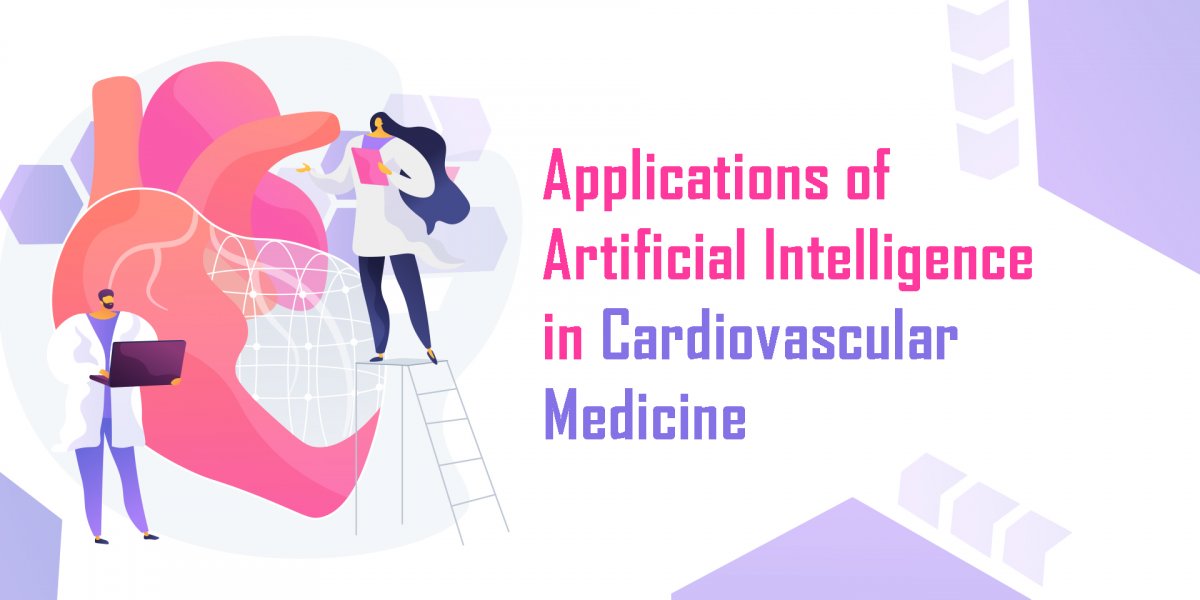There are several examples of artificial intelligence that we come across every day. In the past few years, the applications of artificial intelligence in medical diagnosis have increased considerably after the COVID-19 pandemic. Artificial Intelligence (AI), the intelligence exhibited by machines, has impacted every industry, sector, and the modern world. Artificial intelligence is the ability of machines and computers to solve problems that would otherwise necessitate human intervention. Advanced computing has made it possible to analyze large volumes of data quickly with great accuracy and consistency. Applied artificial intelligence, which involves the use of various algorithms to interpret data, has proved to be a disruptive technology in the fields of medical diagnosis and research. With the advancement and development of AI, its incorporation into the clinical and diagnostic fields, especially in cardiology, has increased tremendously. Medical diagnosis using artificial intelligence in medical diagnosis makes it possible for hospitals and clinics to make data-driven decisions based on medical records about healthcare services offered to patients.
The rise in the number of cardiovascular disease deaths
According to the World Health Organization (WHO), the leading cause of death worldwide is cardiovascular disease (CVD). An estimated 17.9 million lives are claimed every year globally due to CVDs. Stroke or heart attack are the most commonly occurring cardiovascular diseases. To prevent mortality, individuals suffering from cardiovascular diseases or at high risk require early diagnosis or identification.
Use of Artificial Intelligence in the medical diagnosis of cardiovascular problems
Applied artificial intelligence in cardiology helps to improve the decision-making process of doctors and physicians through the power of data analysis. Machines can be guided and trained by AI-driven algorithms to interpret the results of various diagnostic tests such as electrocardiograms (ECG) and angiograms and identify abnormalities quickly. The reduced diagnosis time due to artificial intelligence technology can be a lifesaver for several heart patients.
The use of artificial intelligence in medical diagnosis can also help determine the risk of patients towards congestive and chronic heart failure, thus allowing cardiologists to start early treatment and medications.
How is applied artificial intelligence being used in cardiology?
- Capability of AI algorithms to read echocardiograms helps cardiologists identify and diagnose heart health issues quickly.
- AI-driven algorithms can also help to monitor and evaluate the rate at which blood is being pumped by the heart.
- AI technology is used for early detection of the possibility of developing heart disease, especially in individuals who are at a higher risk.
- With AI technology, it is possible to monitor patients with existing heart disease or problems and detect early warning signs of cardiac arrest or heart failure.
- AI algorithms also help physicians and cardiologists recommend the best treatment for a patient depending on his or her heart ailment.
- Based on the real-time data from sensors or from a patient’s medical records (history), physicians can predict cardiac risks in patients.
- Using artificial intelligence in medical diagnosis can help general physicians and cardiologists make the right decisions quickly.
- ML algorithms have the power to detect adverse cardiac events in real-time and identify any anomalies related to the functioning of the heart.
Huge investments in AI-driven cardiovascular care
- Recently, there have been a lot of collaborations and deals in the world of medical diagnosis and treatment for cardiovascular diseases.
- According to the database of GlobalData deals, there have been 151 deals in the cardiovascular devices market involving artificial intelligence technology since 2020.
- In 2021, the deal for AI-driven cardiovascular devices hit an all-time high of almost $1.6 billion.
- In July 2022, Cleerly, the New York-based digital health company that had created a new standard of care for heart diseases, was able to raise $192 million via a Series C funding round for an AI-powered diagnostic heart health platform for coronary atherosclerosis.
- Also in July 2022, Anumana, an AI-driven healthcare technology company, collaborated with Novartis, a leading global healthcare company, to deploy a series of AI-powered algorithms and software solutions that will help diagnose some hidden heart conditions in patients. This collaboration will help boost the development of ECG AI algorithms, empowering physicians to detect any previously undetected life-threatening heart diseases early.
- Cornell University in July 2022 announced a collaboration with New York Presbyterian Hospital. This $15 million collaboration involves deploying artificial intelligence technology to advance cardiac health. This cardiovascular AI initiative will provide superior AI models to doctors for effective diagnosis and risk prevention of heart diseases.
The use of artificial intelligence in medical diagnosis has brought about a significant change in the way cardiologists are detecting and treating heart diseases. The implementation of AI technology opens new opportunities to detect heart problems and assist physicians and cardiologists in choosing the best method of treatment. With applied artificial intelligence and AI algorithms, it is possible to detect any adverse cardiac events like heart failure that are likely to occur in patients having heart problems. A physician can closely monitor a patient while at home without him/her requiring frequent visits to the clinic or hospital.
The use of artificial intelligence in medical diagnosis is completely transforming and reshaping the healthcare industry. Moving forward into the future, artificial intelligence technology will have a significant impact on how cardiovascular diseases are diagnosed, treated, and managed. The rising investments and development of AI in cardiology reflect the true potential for artificial intelligence technology for cardiologists and manufacturers. The ultimate aim of AI technology is to improve the quality of life of patients by early detection and treatment of CVDs. AI technology is all set to shape the future of medical diagnosis, especially in the case of cardiovascular diseases.

